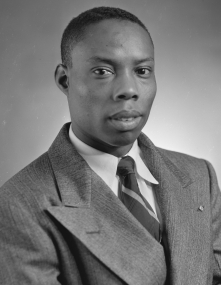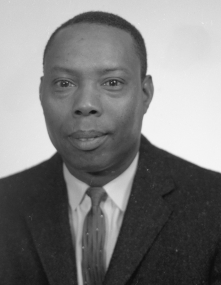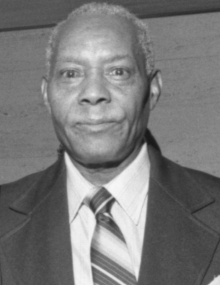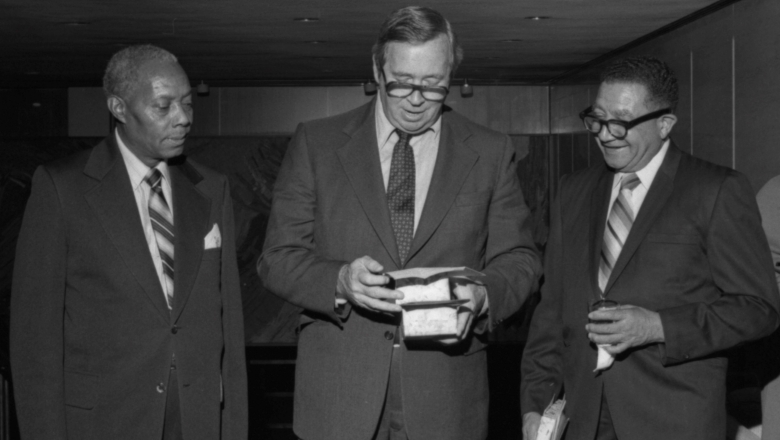Bertha F. Wilson is an Archivist at the World Bank Group Archives in Washington, DC and has worked at the Bank Group for 23 years. As a member of the Archives’ Access to Information team, she works with external researchers and Bank staff to facilitate access to the Bank’s historical records. What follows is a profile of one of the original World Bank staff members, Mr. William (Bill) C. Kelly, Jr. Published as part of our celebration of Black History Month, Mr. Kelly's story highlights the contributions of DC's local community to the early establishment of our institution.

On May 10, 1946, Mr. Kelly, a recently discharged World War II Army veteran, was sitting on a bench in the park known as “Community Park” at the intersection of Pennsylvania Avenue and 18th St. NW in the Foggy Bottom neighborhood of Washington, DC. Mr. Kelly, who had just stopped at the nearby Veterans Administration building to check on his benefits, was minding his own business when a man, introducing himself as Mr. McCorkle, asked for help. Mr. McCorkle was moving boxes from the U.S. Treasury Department to the tenth floor of 1818 H. St NW, the new home of the International Bank for Reconstruction and Development, or World Bank.
Mr. Kelly agreed and helped Mr. McCorkle move the boxes. After the work was done, Mr. McCorkle learned that Mr. Kelly was an unemployed war veteran, and he hired him on the spot. And that was how Mr. Kelly became one of the 26 staff members employed by the Bank when it opened for business on June 25, 1946. Mr. Kelly worked in the Office Services Department where his career growth mirrored the Bank’s growth as he went from mimeographing and delivering copies of Bank documents to managing the work and staff of the Print Shop using state of the art machinery.

Learning that Mr. Kelly played guard on the basketball team piqued my interest because I believe that guards are the quarterbacks of basketball and this reflects on him as a leader even though he wasn’t a senior manager or director. Full disclosure: I also played guard in high school.
In my quest to get a better idea regarding who Mr. Kelly was and what he was like, I reached out to his former colleague and basketball teammate, Mr. Colin Russell, as well as Mr. Kelly’s daughter, Yvette.
Mr. Russell recalled that the Kelly family lived in Washington DC’s Fort Totten neighborhood, a historic upper northeast community that grew rapidly after veterans returned from World War II. Today the area is known for its Metro stop just before the Maryland suburbs. Mr. Russell remembers Mr. Kelly as hard working, conscientious, well-liked and respected throughout the Bank. When asked about the basketball games mentioned in Bank Notes, he thought they were nice get-togethers. Mr. Russell, originally from Jamaica, noted that Mr. Kelly hosted picnics for the Print Shop staff at his Virginia property and that he collected aluminum plates destined for the trash after being used on the offset presses.

The Kellys were newlyweds when Bill started his Bank career, and his wife Edith was a teacher. When asked about her mother’s career, Yvette noted that her mom was a schoolteacher for over 40 years for the DC Public Schools system; she taught first at Langley Jr. High School and then at the old H.D. Woodson High School when it opened in 1972 until her retirement in 1984. While I was in high school in the 1970s, I remember Woodson as an academic and sports powerhouse. In fact it boasted a 95% graduation rate from 1975-1979, and was named in honor of Howard Dilworth Woodson, an African American civil engineer and civic leader who “led successful campaigns for better services in neglected African American neighborhoods in far Northeast DC.”

As I look back at Mr. Kelly’s Bank career, I am reminded of my own dad who worked for the United States Postal Service and all the Black fathers in my Shaw neighborhood who donned fedoras as they headed off to work at one -- and sometimes two -- jobs to support their families.
I can imagine that Mr. Kelly was an excellent role model for his colleagues, family and neighborhood with his conscientious work ethic and military experience. No matter our grade or role, we each bring our own unique experiences, stories and care for our work that collectively strengthen the World Bank Group and contribute to its success.
In the Bank’s early years, it took the hands of many to lay the cornerstone of the institution including those who worked behind the scenes like Mr. Kelly. These hidden histories can be found in the WBG Archives, which I have the opportunity to encounter in my work almost every day.
Mr. William C. (Bill) Kelly, Jr., originally from North Carolina, passed away in June 1996.
References
"Bouquets to Those Who Help Make Bank Notes Possible," International Bank Notes (Vol. 2, Issue No. 17), September 1948, p. 2.
"Bank Pioneers," International Bank Notes (Vol. 6, Issue No. 6), June 1952, p. 8-9.
"Ten Year Milestone," International Bank Notes, (Vol. 10, Issue No. 3), January/February 1956, p. 13.
"Still Going Strong?" International Bank Notes, (Vol. 10, Issue No. 3), March 1958, p. 12.
"Two staff celebrate their retirement from Print Shop," Bank Notes, January/February 1980, p. 4.
Donovan, Edward. World Bank Group Archives oral history interview transcript, May 29, 1984.
“Civil Rights Tour: Civic Activism - Howard Woodson, Advocate for Northeast,” DC Historic Sites website, https://historicsites.dcpreservation.org/items/show/979, accessed Feb. 11, 2021.
"H. D. Woodson High School," https://offbeatenpathdc.com/h-d-woodson-high-school/, accessed Feb. 19, 2021.